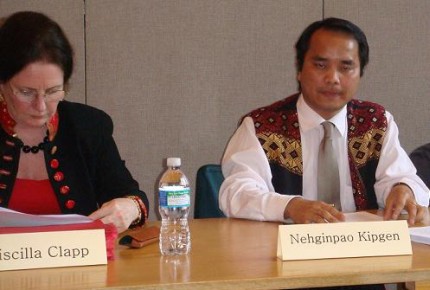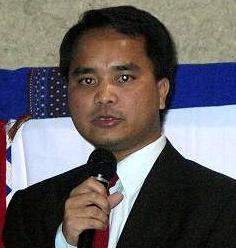Ethnic tension and minority perspective on Burma's problems
By Nehginpao Kipgen *
When exploring the probable solution for the Union of Burma's problems, any analysis based exclusively on the present political development is inconclusive. Burma has never been an ethnically and politically unified country since independence from the British in January 1948.
The history of Union of Burma starts at Panglong in southern Shan state on February 12, 1947, when 23 representatives from the Burman government, Chin hills, Kachin hills and Shan states signed an agreement in the presence of representatives from the Executive Council of the governor of Burma, to form an interim government.
Prior to the birth of Union Day, all ethnic nationalities were separate entities, and therefore, there was no question of minority or majority issues. Even today, ethnic nationalities of the seven states are majority in their respective states.
The successive Burman-dominated military regimes have been using Burmanization policy and forced assimilation to marginalize other ethnic groups. The concept of minority-majority is a deliberate move by the military to undermine the non-Burman ethnic nationalities.
Today, the term ethnic minority is widely used as a natural phenomenon by the international community to refer the non-Burman ethnic nationalities. For the sake of the audience, I will use the term ethnic minorities to describe the non-Burmans.
The military regime identifies "135 national races" of which the major ones are Arakan/Rakhine (7 sub-groups), Burman/Bamar (9 sub-groups), Chin (53 sub-groups), Kachin (12 sub-groups), Karen/Kayin (11 sub-groups), Karenni/Kayah (9 sub-groups), Mon (1 group), and Shan (33 sub-groups).
The 135 races are categorized primarily on dialectical variations. This classification is an attempt by the military to justify its centralized 'disciplined democracy' under the pretext of ethnic diversity. Ethnic minorities constitute over 30 percent of the total population. However, precise statistics is not available; the last census was in March 1983.
Burma's total land area is 261,970 square miles. Ethnic minorities occupy roughly two-thirds: Arakan/Rakhine state- 14,200 square miles, Chin state- 13,907 square miles, Kachin state- 34,379 square miles, Karen/Kayin state- 11,731 square miles, Karenni/Kayah state- 4,530 square miles, Mon state- 4,747.8 square miles, Shan state- 60,155 square miles.
Had not Aung San promised political equality and self-determination, the Union of Burma might never have been born. The Panglong agreement was aimed at establishing a federal government on the basis of equality and self-determination for all ethnic nationalities.
Aung San's assassination shattered the hopes of establishing a federal government: the constitution was hastily drafted on the model of a quasi-federal structure, categorically downplaying the visions of Panglong signatories. This mischievous turn of events became a source of lingering distrust between the Burman government and ethnic minorities.
There were frequent disturbances and political instability. The tension has been primarily between the military and ethnic forces, and not amongst the ethnic groups themselves. This explicitly clears any doubts of Burma plunging into a civil war.
Ethnic armed groups like the Karen National Union (KNU), the Karenni National Progressive Party (KNPP), the Kachin Independence Organization (KIO) and the Shan State Army (SSA), etc. rebelled against the Burman government for years. Although over a dozen of them have reached cease-fire agreements with the military, groups such as KNU and SSA are still fighting against the government.
The basic demand of ethnic minorities has been autonomy. After immense pressure and demands from the federal movement groups, U Nu, the first Prime Minister, agreed for a meeting in a so-called "federal seminar" in mid-February 1962. The volatile situation gave General Ne Win the opportunity for a coup d'etat on March 2.
In an attempt to pacify the longstanding grievances of ethnic minority groups in states and regions, self-administered areas (zones and divisions) are prescribed: five self-administered zones (one in Sagaing division and four in Shan state) and one self-administered division (in Shan state).
Historically speaking, ethnic Burmans have an attitude of chauvinism. There has been ethnic hatred for a long time, and dates back to the country's pre-independent era. One of the reasons for the rise of insurgency problems, after independence, was due to hatred and discrimination on the basis of ethnicity.
For example, in the mid 1940s, the Chins, the Karens and the Mons were looked down upon by the Burmans as if they were little better than barbarians or animals. The Karens were particularly despised by the Burmans, and were referred to as uneducated people, who feed on wild yams and small animals such as snakes, frogs, monkeys, etc.
Burmans aggression on the Karen people had begun before the British occupation of Burma. Similar aggression also happened to other nationalities, including the Arakans and the Mons who suffered miserably.
There has also been persecution and restriction on minorities, belonging to religions other than Buddhism. In one gruesome incident, an ethnic Kuki village called Nung Kam, a Christian village in Sagaing division, was bulldozed in the beginning of 1993 on the ground that the villagers refused to convert to Buddhism. After it was bulldozed, a new Burman village known as Saya San was built.
Chapter X of the 1947 constitution gave states a right to secede from the Union after 10 years of the constitution in operation. U Nu's invitation of Newin to form a caretaker government in 1958 was largely a premeditated political maneuvering to prevent the Shans and Karennis from seceding from the Union.
Contrastingly, chapter II of the military's new constitution says: "No part of the territory of the Union, namely regions, states and self-administered areas etc. shall ever secede from the Union." This is a plan to consolidate the military's iron-fist rule on ethnic minorities.
Ratification of the new constitution means nullifying the Panglong agreement. As long as Burma fails to honor the principles of Panglong agreement, the true spirit of Union Day will never be realized despite its observance for the past 60 years. Therefore, every nationality in the Union of Burma has the right to claim its pre-independent status.
While ethnic minorities waited years for a negotiated solution, the military on April 9 announced that it will hold a referendum on the new constitution on May 10, which will be followed by countrywide general elections in 2010. The constitution was made public just barely 30 days before the referendum.
With independent or international observers being barred from monitoring the referendum process, use of fraud and coercion has become a great concern. There are reports that citizens have been forewarned to vote only 'yes' in the upcoming referendum.
The military's constitution drafting process was undemocratic. Among others, the constitution was drafted by hand-picked delegates, excluding the opposition groups. No debate on the constitutional principles was allowed.
Moreover, 25% of seats in both houses (House of Representatives and House of Nationalities) are reserved for the military. Amendment of constitution requires the approval of more than 75% of votes, which could be construed as a design to perpetuate military dominance.
The voice of the main opposition party National League for Democracy, which won over 80% percent of parliamentary seats during the 1990 general elections, is virtually silenced. Not the slightest consideration is also given to a federal constitution drafted by Federal Constitution Drafting and Coordination Committee in exile.
|
The military has not announced any definitive plan on what to do if the referendum fails. During the 1990 general elections, the military expected to win under a free and fair voting process. The justification for nullifying the results was to have a constitution drawn first. We never know what excuse lies ahead if the upcoming referendum fails.
Even if the State Peace and Development Council is successful in advancing with its proposed roadmap, I am skeptical that it will bring a durable solution to the country's ethno-political problems.
To ethnic minorities, the struggle in Burma is fundamentally a two-stage process – (a) restoration of democracy and (b) political autonomy. Any democratic set-up sidelining ethnic minorities will not bring an end to decades' old political imbroglio.
Ethnic minorities have long advocated for tripartite talks involving the military, 1990 election winning parties led by Aung San Suu Kyi and ethnic groups as endorsed by the United Nations General Assembly since 1994, but to no avail.
Meanwhile, the international community could consider a similar model of a six party talks on North Korean nuclear issue. Due to geographical proximity, enormous economic and diplomatic influence over Burma, China's participation is pivotal.
In the absence of a concrete mandate from the UN Security Council, special envoy Ibrahim Gambari's mission has become a symbolic exercise in futility. Although it may be naïve to even consider it, the swiftest way to bring change would be by military intervention, either by the United States or by the United Nations.
Western sanctions, without cooperation from neighboring Asian nations, are also not efficacious. The vacuum created as a result of sanctions has been filled by neighboring countries. Conflicting interests of two different approaches – sanction and engagement - will continue to prolong the survival of military regime.
So far, the military regime apparently has withstood pressures from the international community. Change from within the country is also unlikely to emerge without support and cooperation from elements within the military which has governed the country since 1962.
The Burmese opposition now basically has two choices to make – either to accept the military's seven-step roadmap as a step toward national reconciliation or take a hardliner stance to remove the military dictatorship by hook or by crook.
A long lasting solution to the conflicts in Burma needs the sincerity, honesty and participation of all ethnic groups. Different ethnic groups should be brought into confidence, and their legitimate demands should be looked into. This process of democratization has to be an inclusive approach.
Note: This paper was presented at a panel discussion on Burma/Myanmar: The Four Crises - Economic, Social, Political, and Ethnic Minority at Georgetown University, Washington, DC on April 23, 2008.
|
* Nehginpao Kipgen is the general secretary of the US -based Kuki International Forum and a researcher on the rise of political conflicts in modern Burma (1947-2004). He is also the editor of www.kukiforum.com. He can be contacted at nehginpao(at)yahoo(dot)com . This article was webcasted on April 25, 2008.
* Comments posted by users in this discussion thread and other parts of this site are opinions of the individuals posting them (whose user ID is displayed alongside) and not the views of e-pao.net. We strongly recommend that users exercise responsibility, sensitivity and caution over language while writing your opinions which will be seen and read by other users. Please read a complete Guideline on using comments on this website.









